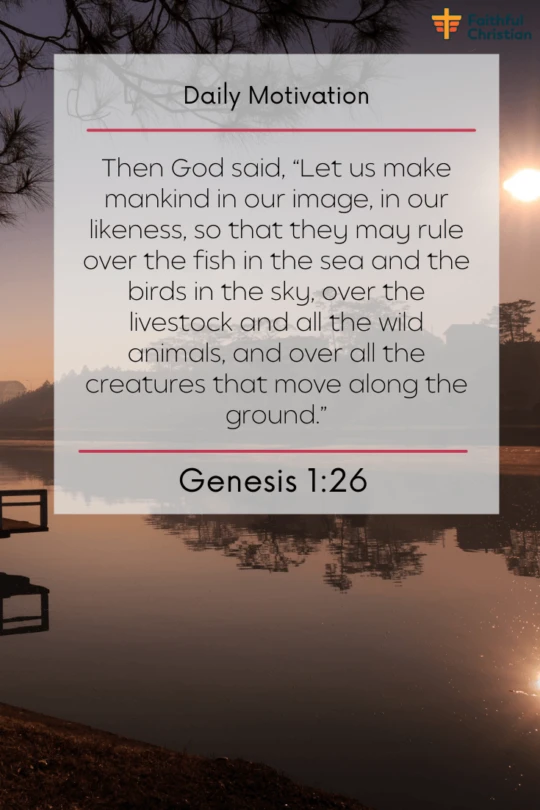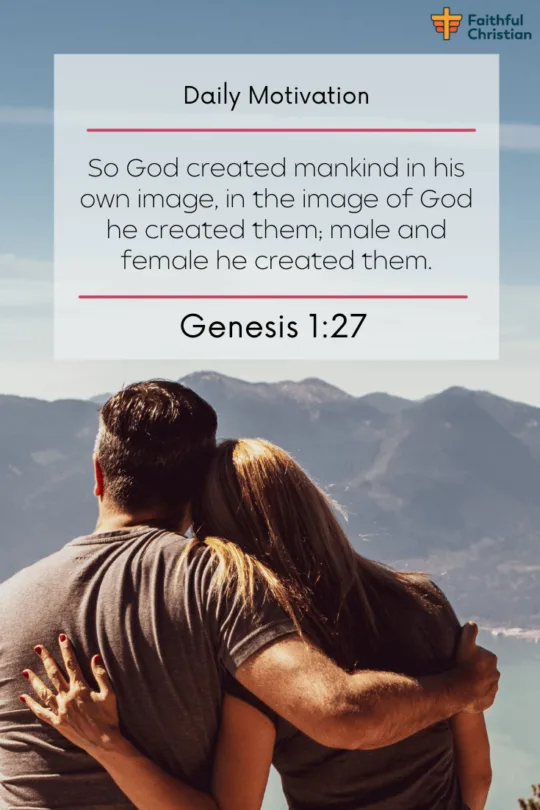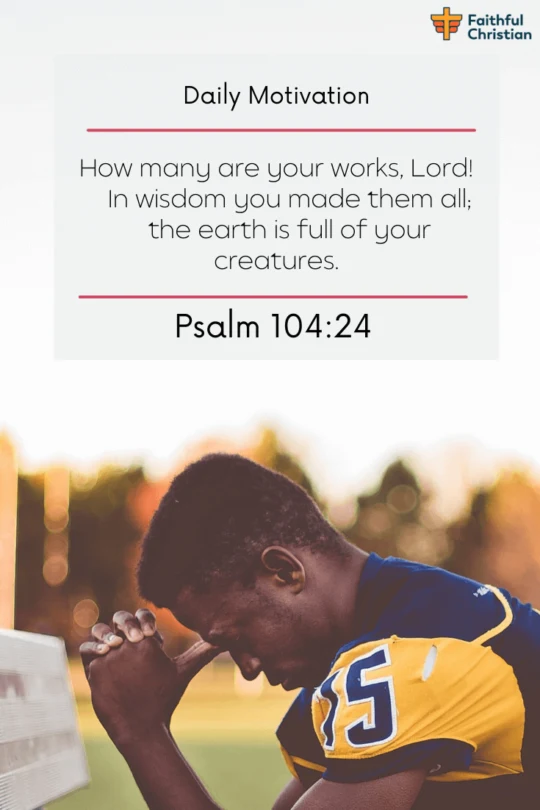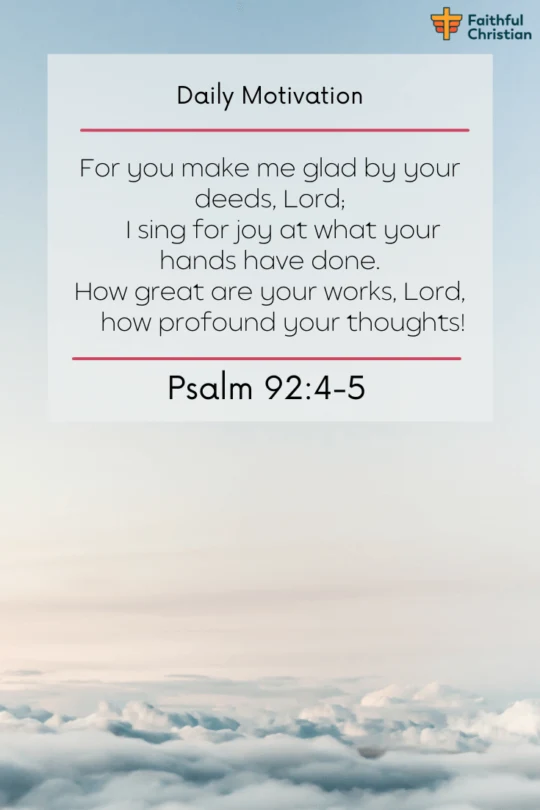Self-love is the regard for one’s well-being and happiness.
That is, you find the best way possible to make yourself happy despite all your troubles.
But what does the bible say about self-love?
Is it scriptural to love yourself more than others?
The good news is that there are many bible verses about self-love that we can learn from.
In fact, we can learn from numerous examples in the scripture.
How did Christ behave on earth? Was he an advocate for self-love?
The truth is there is nothing wrong with trying to find happiness and loving yourself.
With lots of troubles we face daily, we must search internally for our joy.
We must build our self-esteem and make sure we are content with who we are.
Having said that, self-love taken too far is a sin.
That is, when you put yourself first, before the needs of others.
Or when you are self-reliant on your abilities with pride and arrogance.
God hates the proud and blesses the humble.
Christ said,
“A new command I give you: Love one another. As I have loved you, so you must love one another. 35 By this everyone will know that you are my disciples, if you love one another.”
John 13:34-35
I have put together bible verses about self-acceptance and self-love.
Recommended for you
- What Does the Scripture Say About self-control
- Scriptures about loving others equally
- 24 Powerful Scriptures Love Your Neighbor
- What does the Bible say about loving yourself first
Bible verses self-acceptance and self-love

Proverbs 19:8

The one who gets wisdom loves life;
the one who cherishes understanding will soon prosper.
What’s the essence of self-love? Growth. One pathway to this growth is wisdom, a core concept of self-love presented in Proverbs 19:8: “Whoever gets sense loves his own soul; he who keeps understanding will discover good.”
Wisdom is a seed we plant in our minds, nourishing our souls. It’s not just about knowledge; it’s about nurturing ourselves, growing, blooming.
In the biblical realm, King Solomon understood this. He didn’t seek wealth or power from God; instead, he asked for wisdom (1 Kings 3:9). Why? Wisdom, to him, was a form of self-love, a tool for self-improvement.
Today, we see this pursuit of wisdom in our lives. Consider a person who regularly takes professional courses. They aren’t just learning; they’re growing, proving their love for themselves through self-improvement.
Wisdom, however, isn’t an endpoint; it’s a journey towards understanding and acceptance. Each lesson, every mistake, is a step on this path.
As we garner more wisdom, we understand more about ourselves. This understanding fosters self-love and acceptance.
Wisdom is vital for a fulfilling life. It helps us tackle life’s complexities, make informed decisions, and lead a life that resonates with our values. Wisdom shapes our character, molds our perspectives, and impacts our life’s quality.
The Word of God is a source of wisdom. Psalms 119:11 urges us to internalize God’s Word. Joshua 1:8 asks us to meditate on His laws. Applying these scriptures in our lives is a way to nurture our self-love, fostering personal growth.
To love oneself, seek wisdom. This enduring quest leads us towards understanding, acceptance, and a fulfilling life.
Like Solomon, let us desire wisdom. It’s a deep expression of self-love, a commitment to becoming our best selves. With wisdom, we can blossom into who we’re meant to be.
Proverbs 8:35-36

For those who find me find life
and receive favor from the Lord.
36 But those who fail to find me harm themselves;
all who hate me love death.”
The Bible verse Proverbs 8:35-36 takes us on a journey. It speaks of finding life, gaining favor from the Lord, and the pitfalls of ignoring wisdom. Now, let’s delve into its depths.
Remember Zacchaeus from Luke 19:1-10? His journey was one of transformation. This man, once despised for his questionable profession, sought life. He pursued Jesus, defying ridicule to climb a tree just to see Him.
Zacchaeus’ story shines a light on our first stop: finding life and favor in the sight of the Lord. He sought wisdom, and in doing so, Zacchaeus found self-love and acceptance.
Let’s pull this scene into a familiar setting. Picture a person, stepping into a therapist’s office. Recognizing their need for emotional healing, they seek help. It’s a courageous act of self-love. It’s about accepting their journey to wellness. By acknowledging their need, they, like Zacchaeus, find life.
But what if we don’t seek wisdom? Proverbs 8:36 warns us. The cost is self-harm, even a symbolic affinity for death.
It’s a far cry from the self-love and acceptance that comes with wisdom. I believe seeking God is an act of self-love. It opens our eyes to our worth in His sight, which fosters self-acceptance.
Consider Matthew 6:33. Jesus tells us to prioritize God’s kingdom. Aligning with God leads to a fulfilling life. John 14:6 echoes this. Jesus states He is the way, the truth, and the life. So seeking God equates to seeking life.
However, misunderstanding these truths can lead us astray. A lack of understanding might result in misdirected efforts or harmful habits. Scripture urges us to choose wisdom, to choose life.
In short, Proverbs 8:35-36 invites us to seek wisdom. It presents the benefits – a life imbued with self-love and acceptance. If we desire such a life, we must make God our priority.
So, let’s reflect on these truths. Let’s seek wisdom and discover life.
Song of Solomon 4:7

You are altogether beautiful, my darling;
there is no flaw in you.
“You are beautiful, without a single flaw.” That’s what Song of Solomon 4:7 declares. It’s a message straight from God to you and me.
Have you admired a sunset? The harmony of colors, the reflection shimmering on the water – that’s pure beauty. It’s God’s artwork. Psalms 139:14 informs us that we’re part of that art. Fearfully. Wonderfully. Made. Our inherent worth is undeniable.
God doesn’t make mistakes. Ephesians 2:10 confirms it. We are His craftsmanship. So, what’s the bottom line? We are perfectly made. This doesn’t say we’re free from errors. It says our value isn’t defined by them. This is a key element of self-love.
Unfortunately, society often undermines our self-perception. It sends us messages: “You’re not good enough. Not attractive enough. Not enough, period.” It’s a distorted view. This can lead to self-doubt and dissatisfaction. We must rise above this harmful noise.
Take Esther’s story, for instance. She risked her life for her people. Why? Because she accepted her true self. Her courage stemmed from self-love. Like her, when we acknowledge our worth, we gain strength to face life’s battles.
In our world, people confront prejudice and assert their rights. Their bravery comes from self-acceptance. It’s fueled by self-love. These warriors remind us that accepting and loving ourselves is empowering.
Imagine a sunset, its colors dancing in perfect harmony. This is how God sees us, as perfect blends of strengths and weaknesses. When we see ourselves in this light, self-love becomes a natural response.
Remember, in God’s eyes, we are flawlessly beautiful. It’s time to see ourselves through this lens.
Song of Solomon 1:15

How beautiful you are, my darling!
Oh, how beautiful!
Your eyes are doves
The verse, Song of Solomon 1:15, is a divine affirmation of love. It paints a vivid image of our worth in God’s eyes. When we grasp this truth, our self-perception changes. We see ourselves as “fair,” as beautiful, just as He does.
Consider Zephaniah 3:17. It speaks of God, mighty and loving, rejoicing over us. What a profound image! God is glad because of you. This realization fosters a sense of self-worth, and I urge you to embrace it. You are loved. You are valued. These truths plant the seeds of self-love in our hearts.
David, the shepherd-turned-king, was a man well-acquainted with adversity. His life was marked by trials, tribulations, and personal failings.
And yet, amidst it all, he celebrated God’s love for him in Psalms. Even with his shortcomings, he understood his value in God’s eyes, a shining example of self-acceptance.
Like David, we too can celebrate God’s love for us, despite our imperfections, and understand our unique value.
1 Peter 2:9 describes us as “chosen,” “royal,” and “holy.” These divine affirmations inspire self-love. They tell us that we are His. These affirmations can become our own, guiding us towards self-acceptance.
Now, let’s consider a real-life scenario. Picture a person who battles negative self-perception, the mirror reflecting not who they truly are, but a distorted, diminished version.
Now, imagine them standing tall, practicing self-affirmations. They are not affirming worldly values, but rather, they affirm their worth as a beloved child of God, echoing the divine affirmation.
“I am fair. I am loved. I am chosen. I am His.” As they recite these words, they counter the falsehoods of negative self-perception, asserting their worthiness.
Through this practice, they are essentially practicing self-love, an exercise in aligning their image with the image God holds for them.
In conclusion, remember that you are precious to God. Your self-image should echo His love for you. Embrace your divine identity. Accept His love. Make these affirmations a part of your life.
In doing so, we foster a robust sense of self-love and acceptance.
Psalm 139:13-15

For you created my inmost being;you knit me together in my mother’s womb.14 I praise you because I am fearfully and wonderfully made;your works are wonderful,I know that full well.
Understanding Psalm 139:13-15, we realize our unique, intentional design by God. “For you created my inmost being; you knit me together in my mother’s womb…”
This passage provides the foundation for self-love and acceptance. Each of us, masterfully created by God, bears purpose and divine intention.
Take Jeremiah, for instance. Jeremiah 1:5 says, “Before I formed you in the womb I knew you…” Filled with self-doubt, Jeremiah initially resists his prophetic calling. But, God’s reassurance about his divine origin leads him to accept his role.
Like Jeremiah, we must recognize our place in God’s grand design. Isaiah 44:24 reiterates this, saying that the Lord, who formed us, is also the maker of everything else.
Think about our world’s beauty standards. We often attempt to conform, ignoring our unique, divine beauty. Instead, let’s embrace our individual physical features, lovingly crafted by God.
Disregarding our unique creation process means neglecting God’s design. We are each fearfully and wonderfully made, a distinct masterpiece. It is in aligning with our divine purpose that we find self-love and acceptance.
We are not products of chance, but divine design. In life’s journey, we should find comfort in that truth. Self-love and acceptance come from understanding who we are in God’s eyes.
In conclusion, embracing our divine origin fosters self-love and acceptance. We are God’s masterpieces, designed with intention and filled with purpose. Knowing this, we should celebrate our individuality and the unique place we hold in this world.
Understanding that I am a masterpiece designed by God is a beautiful, liberating realization. You, too, are a product of His intentional design. It’s a wonderful reason to love and accept ourselves.
Genesis 1:26

26 Then God said, “Let us make mankind in our image, in our likeness, so that they may rule over the fish in the sea and the birds in the sky, over the livestock and all the wild animals,[a] and over all the creatures that move along the ground.”
“Let us make man in our image,” states Genesis 1:26, revealing a profound truth about human nature.
Imagine a renowned artist crafting a masterpiece. Wouldn’t it hold immense value, being a product of the artist’s skill? You, too, are a masterpiece, designed in the likeness of the ultimate Creator.
When we grasp this truth, our self-view shifts. We’re not mere specks in the universe. We’re divine reflections, carrying a value beyond measure. Embracing our divine origin fosters a self-love rooted in understanding our inherent worth.
Consider the biblical character Daniel. Amidst foreign pressures, Daniel chose to honor his God-given identity by refusing the king’s food (Daniel 1:8). His decision demonstrated self-love, reflecting his understanding of his divine worth.
This idea translates into our lives today. I think of a person who opts for a healthy lifestyle, valuing their body as a vessel of divine likeness. They show self-love by making choices that nurture and respect their well-being, free from societal influences.
Also, our divine origin shapes our interactions with others. If we carry God’s image, so do the people around us. This realization breeds respect for others, broadening our self-love to include love for our neighbors.
Understanding our divine likeness can thus revolutionize our self-perception, guiding us towards authentic self-love. Like Daniel, we, too, can navigate our journey, aware of our divine value.
Remember, we bear God’s image. Let this divine truth be the mirror in which we see ourselves.
Genesis 1:27

27 So God created mankind in his own image,
in the image of God he created them;
male and female he created them.
Diving into Genesis 1:27 uncovers crucial insights about self-love and acceptance. The verse shares, “God created man in his own image…male and female created he them.
This statement holds two profound truths.
First, being “in his own image” signals our inherent value. Regardless of our gender, we each reflect divine aspects. This understanding feeds self-love.
Each of us is a product of divine design, not random chance. We mirror God’s image uniquely, a fact that fosters self-acceptance.
Our gender is not an afterthought; it’s a crucial part of God’s plan. Accepting our gender fosters self-love, for we’re accepting a divine gift.
Looking at Galatians 3:28, Paul teaches equality of all believers in Christ, independent of their gender. This echoes Genesis. It reminds us that we can love and accept ourselves, mirroring God’s love for all His creation.
Second, let’s connect these biblical insights with real-world events. A global push for gender equality reflects the self-love and acceptance that the Bible teaches. This movement, in essence, mirrors God’s acceptance of us, as conveyed in Genesis 1:27.
In a nutshell, self-love and acceptance start with understanding our worth as God’s creation. Accepting our gender as a divine gift boosts this self-love.
Let’s celebrate our gender assignment, for it’s a gift from the divine. We’re not just practicing self-love but living God’s love for us.
Psalm 104:24

How many are your works, Lord!
In wisdom you made them all;
the earth is full of your creatures.
The wisdom behind Psalm 104:24 is stunning. It speaks volumes about the beauty of God’s creation, acting as a reminder of our value.
As I observe the world around us, it’s impossible not to marvel at God’s diversity and abundance. The intricate details reflect the work of an Intelligent Designer, the same Designer who shaped you and me.
In Romans 1:20, we see that God’s invisible qualities are evident in His creation. This complexity mirrors our inner selves. Like every unique snowflake, we’re endowed with skills and traits that set us apart. Recognizing this in ourselves is a form of self-love.
Isaiah 40:28 further illuminates this thought. It speaks of an eternal Creator, whose wisdom is boundless. This Creator crafted us with intention, offering proof that we’re more than mere accidents. We’re deliberate works of art, meant to love and accept ourselves.
Job’s speech in Job 12:7-10 exemplifies this understanding. Despite his immense suffering, he acknowledged the splendor of God’s creation. He found acceptance in his place within the grand design.
This serves as a profound lesson. Even when faced with adversity, recognizing our place in God’s creation can foster self-acceptance.
This acceptance is reflected in our real-world experiences. When we connect with nature, we gain a greater sense of self.
Stand by the ocean, feel its grandeur, and you’ll understand your worth. We each play a unique role in this world, as integral as any creature.
God’s creativity in nature echoes the uniqueness within us. No two sunsets are alike, just as no two individuals are identical. We’ve been deliberately crafted, infused with a spark of the Divine.
In summary, embracing our unique place in the world, like every creature in the ecosystem, is an act of self-love. It’s an appreciation of God’s work and an affirmation of His wisdom in our design.
As we marvel at His creations, we should remember the truth in Psalm 104:24, “In wisdom, you have made them all.”
Psalm 111:2

Great are the works of the Lord;
they are pondered by all who delight in them.
The beauty in Psalm 111:2 lies in its wisdom about self-love and acceptance. It reads, “Great are the works of the LORD, studied by all who delight in them.” This passage urges us to find joy in exploring God’s creations.
I want us to take a step back. Think about Mary, the mother of Jesus. She was a young woman thrust into a unique and challenging role – to carry and raise the Son of God.
The Gospel of Luke tells us that Mary “treasured up all these things, pondering them in her heart” (Luke 2:19). She was studying the miracle unfolding within and around her, accepting her role in God’s grand design.
Despite the uncertainties, she delighted in the works of the Lord, fostering self-love and acceptance. Mary’s story challenges us to find delight in exploring our own role in God’s great tapestry.
The delight in studying God’s works enhances our appreciation for His depth. Romans 11:33 describes, “Oh, the depth of the riches and wisdom and knowledge of God!” This depth reflects our inner complexity. We are God’s miraculous creations. As we grasp His creation, we understand ourselves better.
The vastness of God’s creation shows our greatness too. Job 5:9 says, “He performs wonders that cannot be fathomed, miracles that cannot be counted.” We are these miracles. As we comprehend His creation, we love and accept ourselves more.
Understanding God’s works sparks transformation. It cultivates self-love and acceptance. We are part of God’s great design, a unique blend of strengths and flaws. As we marvel at His creation, we strengthen our relationship with Him and ourselves.
I urge you to ponder like Mary. Dig into the richness of God’s creations. Embrace the self-discovery it sparks.
As you comprehend His creation’s depth, find a deeper sense of self-love and acceptance. You, like everyone else, are a valuable thread in God’s magnificent tapestry.
Psalm 92:4-5

For you make me glad by your deeds, Lord;
I sing for joy at what your hands have done.
5 How great are your works, Lord,
how profound your thoughts!
Every dawn ushers in a fresh start, a gift in itself. Psalm 92:4-5 opens a window into this feeling of renewal, celebrating God’s deeds. “For you make me glad by your deeds, LORD; I sing for joy at what your hands have done. How great are your works, LORD, how profound your thoughts!”
This verse plants a seed of self-love. This sprouts from the understanding of God’s wisdom in our lives.
James 1:17 mirrors this message. It speaks of God’s gifts, unchanging and perfect. Each one of us is such a gift, unique and wonderfully created. Acknowledging this sparks self-love, realizing our inherent value in God’s creation.
Job 12:7-10 reaffirms our role in the universe. We’re not merely bystanders, but integral parts. This passage illuminates God’s wisdom, reflected in every creature and being. It’s a call to awe, which can stir self-love and acceptance within us.
Consider King David’s life. He attributed his victories to God’s works, expressing deep gratitude. It reflects an understanding of his role in God’s grand scheme, a testament to self-acceptance.
In our lives too, every achievement is a sign of God’s wisdom. Conquering a fear, breaking a habit, achieving a goal – these are moments for gratitude. This act of thankfulness is, in itself, self-love. It is a recognition that our capabilities are gifts from above.
To conclude, contemplating God’s works and recognizing His wisdom within us nurtures self-love. By seeing ourselves as part of His marvelous creation, we learn to love and accept ourselves. Gratitude for His works is a reflection of our self-love and acceptance.
Today, let’s celebrate – celebrate being part of His wonderful creation, each step in our journey, and ourselves. As I often remind myself, “I am fearfully and wonderfully made.”
Recommended for you
More bible verses about self-love
2 Timothy 4:3
Romans 12:10
Philippians 2:3
Ephesians 5:29
Ecclesiastes 4:5
Proverbs 11:17
2 Timothy 3:1-3
2 Timothy 3:4-5
2 Peter 3:3
Galatians 5:26
1 Peter 5:5
Ephesians 4:2
John 15:12
1 John 4:21
Romans 5:8
John 15:13
1 John 3:16
Recommended for you
- What Does the Scripture Say About self-control
- Scriptures about loving others equally
- 24 Powerful Scriptures Love Your Neighbor
- What does the Bible say about loving yourself first
Self-love: Words to encourage you
1. You are perfectly made
I grew up in a neighborhood where beauty matters a lot.
If you do not look good, you could easily be embarrassed by your friends.
I have come to realize that you are who you say you are.
If you do not love yourself and appreciate your inner beauty, others will make you feel less of yourself.
That’s why we must accept ourselves because we are beautifully made.
God has made us in his image and has given us life.
Our concern shouldn’t be what others think about us.
We are perfectly made in God’s shape and form.
So, if anyone thinks you don’t look good, be rest assured that he or she is ignorant.
Can he create even a single hair on your body?
Everything was made perfect and beautiful in his time.
So, don’t look down on yourself.
2. Learn to love yourself with your flaws
We all have spots.
Even the most beautiful people on earth have their challenges.
What you see outwardly isn’t always what it truly is.
We must learn to appreciate the works of God.
He has created us, but we have our challenges.
If you are black, there is no reason to feel inferior.
Likewise, if you are white, there is nothing wrong with you.
Or, if you have any form of disability, you must appreciate yourself the way you are.
God loves us so much and has given us life to serve him.
Our beauty and body will decay the moment we die.
All the fuss over how you look will disappear in a second God takes away our life.
So, what’s the point of striving to look too beautiful or looking down on yourself?
God is our hope and strength. Love yourself and be contented.
3. Be humble with God’s blessings
Don’t be so self-reliant on yourself.
Self-love could easily make you overthink yourself.
God hates pride and wants us to be humble.
Are you blessed with beauty? Or are you blessed with riches?
God has blessed you, and you must be humble.
Remember that all things are vanity and do not count for eternity.
What matters is fulfilling God’s word to love one another.
The scriptures say,
For the entire law is fulfilled in keeping this one command: “Love your neighbor as yourself.”
4. Love others even more
It is selfish to love yourself first before your neighbors.
In fact, it goes contrary to what the bible teaches. In other words, it is a sin.
We must love others and try to meet them in their wants and need.
What difference does it make then if we fail to help those in need?
How are we different from satan and sinners if we love only ourselves?
We must be like Christ and love everyone around us.
As much as we can, we must put others first and love them with our hearts.
The scripture says,
Be devoted to one another in love. Honor one another above yourselves
Frequently Asked Questions
How do you get self-acceptance?
Self-acceptance begins with understanding who you are. It’s about recognizing your strengths and accepting your weaknesses. It also means honoring your unique qualities.
By transforming negative thoughts into positive ones, you grow in self-love and self-care. Setting realistic goals, acknowledging mistakes, and respecting your own needs are crucial too.
What God says about self-acceptance?
In the Christian faith, God is seen as the craftsman of all human beings, each one uniquely designed.
The Psalm 139:14 verse affirms this: “I praise you because I am fearfully and wonderfully made; your works are wonderful, I know that full well.” This divine design implies an inherent worth, encouraging self-acceptance.
What is a good Bible verse for self-love?
Mark 12:31 is a clear Bible verse advocating for self-love: “Love your neighbor as yourself.” It suggests that self-love isn’t selfish but an essential part of a balanced life.
What is the spiritual meaning of self-acceptance?
In spiritual terms, self-acceptance ties into recognizing ourselves as God’s creation. This means acknowledging our intrinsic worth and potential for growth. It also involves forgiving our own past mistakes, inspired by God’s forgiving nature.
This sentiment echoes in Romans 8:1: “There is therefore now no condemnation for those who are in Christ Jesus.”
Why self-acceptance is so powerful?
Self-acceptance is powerful because it brings inner peace and boosts mental health. By accepting ourselves, we live genuinely, appreciating our strengths and accepting our limitations.
This balance creates an independent self-image, rooted in our inherent value.
What are some Bible verses about self-confidence?
Self-confidence, according to the Bible, comes from trusting God. Proverbs 3:26 says, “For the LORD will be your confidence and will keep your foot from being caught.”
Another significant verse is Philippians 4:13: “I can do all this through Him who gives me strength.”
What does the Bible say about self-love and worth?
The Bible underlines our worth and advocates self-love in several passages. Matthew 10:31 says, “So don’t be afraid; you are worth more than many sparrows.” This affirms our value to God.
Furthermore, Ephesians 5:29 encourages self-love by stating, “After all, no one ever hated their own body, but they feed and care for their body, just as Christ does the church.”
Can you share some short Bible verses about self-love?
Short Bible verses can also pack a punch. Psalm 139:14 highlights self-love, stating, “I praise you, for I am fearfully and wonderfully made. Wonderful are your works; my soul knows it very well.”
Similarly, 1 Corinthians 6:19-20 teaches respect for our bodies, reminding us that they are “temples of the Holy Spirit.”
Is there a Bible verse about self-motivation?
The Bible doesn’t directly mention “self-motivation,” but it speaks of diligence and hard work. Philippians 3:14, for instance, says, “I press on toward the goal for the prize of the upward call of God in Christ Jesus.”
Are there any Bible verses about self-beauty?
The Bible values inner beauty over physical attractiveness.
1 Peter 3:3-4 advises, “Do not let your adornment be merely outward…rather let it be the hidden person of the heart, with the incorruptible beauty of a gentle and quiet spirit, which is very precious in the sight of God.”
So, self-beauty isn’t just about looks, but about character and spirit.
